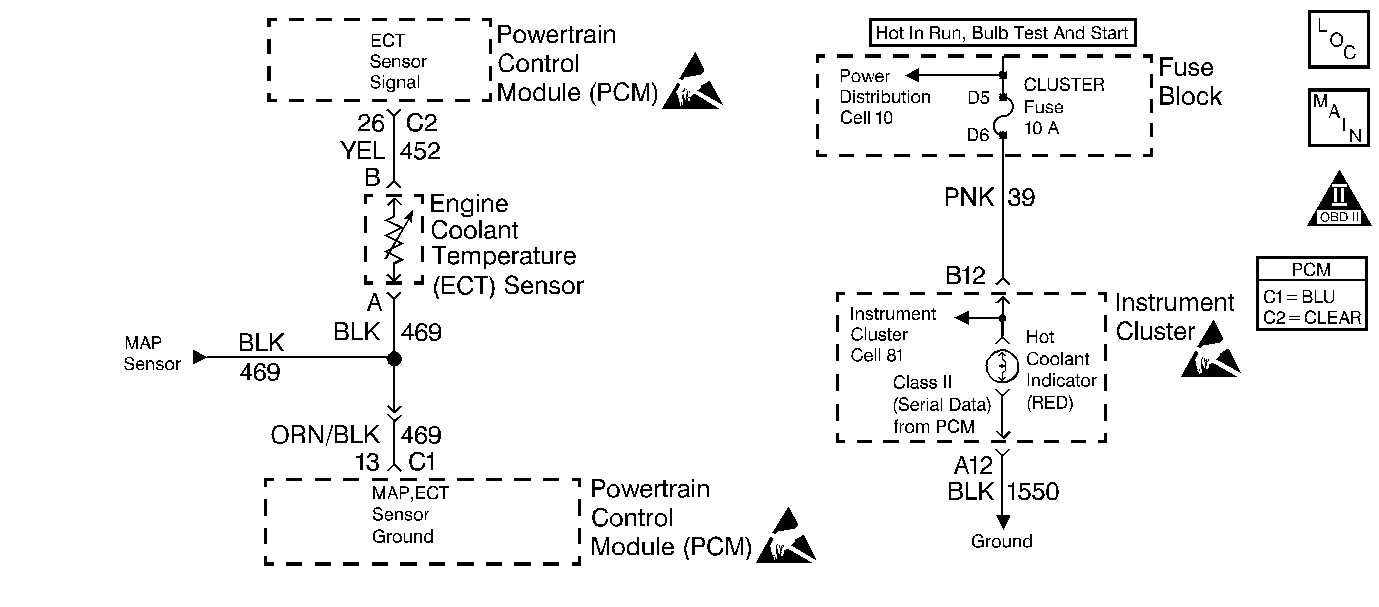
Circuit Description
To provide the best possible combination of driveability, fuel economy, and emission control, a closed loop air/fuel metering system is used. When the vehicle is first started, the PCM controls fuel delivery in open loop, ignoring the heated oxygen sensor (HO2S) 1 signal and calculating air/fuel ratio based on inputs from the engine coolant temperature, throttle position, and mass air flow sensors. The PCM will begin using the HO2S 1 signal for controlling fuel delivery (Closed Loop) when the following conditions have been met:
| • | The HO2S output signal is varying, indicating that the sensor is hot enough to operate properly. |
| • | The Engine Coolant Temperature sensor indicates coolant temperature above 21°C (70°F). |
| • | Time since start-up is at least 15 seconds for a warm engine or 90 seconds for a cold engine. |
Conditions for Running the DTC
| • | No active IAT or ECT DTCs present. |
| • | Start-up engine coolant temperature is below 50°C (122°F). |
| • | Intake air temperature is greater than -6°C (21°F). |
| • | Engine coolant temperature is greater than -40°C (-40°F). |
Conditions for Setting the DTC
The length of time for the engine coolant to reach a stabilized temperature of 22°C (72°F) takes longer than it should. The amount of time ranges between 2 and 7.5 minutes depending on engine coolant temperature at startup and the amount of air cycled by the engine since startup.
Action Taken When the DTC Sets
| • | The PCM will illuminate the MIL during the second consecutive trip in which the diagnostic test has been run and failed. |
| • | The PCM will store conditions which were present when the DTC set as Freeze Frame and Fail Records data. |
Conditions for Clearing the MIL/DTC
| • | The PCM will turn the MIL OFF during the third consecutive trip in which the diagnostic has been run and passed. |
| • | The history DTC will clear after 40 consecutive warm-up cycles have occurred without a malfunction. |
| • | The DTC can be cleared by using the scan tool Clear Info function or by disconnecting the PCM battery feed. |
Diagnostic Aids
DTC P0125 set indicates a skewed ECT sensor. Comparing the engine coolant temperature displayed on a scan tool with actual coolant temperature measured with a thermometer may isolate this condition. If the displayed engine coolant temperature is not close to the actual coolant temperature, replace the ECT sensor. Refer to Engine Coolant Temperature Sensor Replacement .
Check for the following conditions:
| • | Poor connection at PCM. Inspect harness connectors for backed out terminals, improper mating, broken locks, improperly formed or damaged terminals, and poor terminal to wire connection. |
| • | Damaged harness. Inspect the wiring harness for damage. If the harness appears to be OK, observe the display on the scan tool while moving connectors and wiring harnesses related to the sensor. A change in the display will indicate the location of the fault. |
If DTC P0125 cannot be duplicated, the information included in the Fail Records data can be useful in determining vehicle mileage since the DTC was last set.
Test Description
The numbers below refer to the step numbers on the Diagnostic Table:
Step | Action | Value(s) | Yes | No |
|---|---|---|---|---|
1 | Did you perform the Powertrain On Board Diagnostic (OBD) System Check? | -- | ||
2 |
Does the ECT increase to above the specified value within 9 minutes? | 21°C (70°F) | Go to Diagnostic Aids | |
3 | Are any ECT sensor DTCs set? | -- | Go to applicable DTC in Diagnostic Trouble Code (DTC) List | |
4 |
Are the cooling fans off. | -- | ||
5 | Inspect the cooling system for proper coolant level. Is the coolant level OK? | -- | Go to Loss of Coolant | |
6 | Test for proper operation of the thermostat. Refer to Thermostat Diagnosis . Did you find and correct the condition? | -- | ||
Compare the ECT on the scan tool to the actual coolant temperature measured with a thermometer. Is the ECT parameter on the scan tool close to the measured coolant temperature? | -- | Go to Diagnostic Aids | ||
8 |
Did you find and correct the condition? | -- | ||
9 | Replace ECT sensor. Refer to Engine Coolant Temperature Sensor Replacement . Is the action complete? | -- | -- | |
10 |
Does the ECT increase to above the specified value within 9 minutes? | 21°C (70°F) | System OK |
